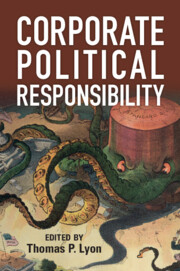Book contents
- Corporate Political Responsibility
- Reviews
- Corporate Political Responsibility
- Copyright page
- Contents
- Figures
- Tables
- Contributors
- Preface
- Section I Foundations of Corporate Political Responsibility: Metrics for Disclosure and Good Governance
- Section II Transparency: Causes and Consequences
- Section III Accountability: Linking Corporate Social Responsibility, Employee Relations, and Corporate Political Responsibility
- Section IV Responsibility: Corporate Political Responsibility and Climate
- Section V Implementing Corporate Political Responsibility: Opportunities and Challenges
- Index
- References
Section II - Transparency: Causes and Consequences
Published online by Cambridge University Press: 16 November 2023
- Corporate Political Responsibility
- Reviews
- Corporate Political Responsibility
- Copyright page
- Contents
- Figures
- Tables
- Contributors
- Preface
- Section I Foundations of Corporate Political Responsibility: Metrics for Disclosure and Good Governance
- Section II Transparency: Causes and Consequences
- Section III Accountability: Linking Corporate Social Responsibility, Employee Relations, and Corporate Political Responsibility
- Section IV Responsibility: Corporate Political Responsibility and Climate
- Section V Implementing Corporate Political Responsibility: Opportunities and Challenges
- Index
- References
Summary

- Type
- Chapter
- Information
- Corporate Political Responsibility , pp. 99 - 154Publisher: Cambridge University PressPrint publication year: 2023



